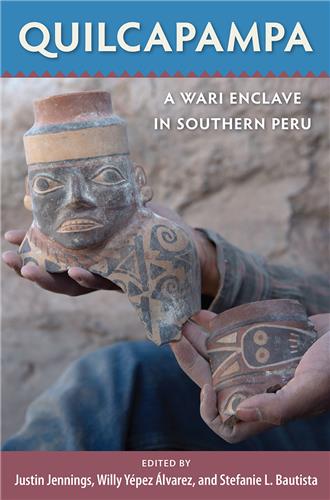Quilcapampa
A Wari Enclave in Southern Peru
Edited by Justin Jennings, Willy Yépez Álvarez, and Stefanie L. Bautista
Hardcover: $90.00
“A comprehensive archaeological look at Quilcapampa, a Middle Horizon colony affiliated with the Wari state. This is a much-needed interpretive reconsideration of the Wari Empire’s impact in the Andes that will serve as a cornerstone for the next generation of Wari archaeology.”—R. Alan Covey, author of Inca Apocalypse: The Spanish Conquest and the Transformation of the Andean World
“Makes a welcome contribution to Wari research by situating the understanding of Wari within a context of first-generation states. Based on detailed archaeological evidence recovered at the site of Quilcapampa in Arequipa, the contributors argue that like other early states worldwide, not all Wari colonies were built with the goal of controlling local populations.”—Véronique Bélisle, Millsaps College
“Presents recent insights into the Wari presence in Arequipa and a new ideological perspective on the Andean Middle Horizon.”—Mary Glowacki, coeditor of The Wari Civilization and Their Descendants: Imperial Transformation in Pre-Inca Cuzco
In the ninth century AD, settlers from the heartland of the Wari Empire founded Quilcapampa, a short-lived site overlooking the Sihuas River in southern Peru. The contributors to this volume present excavation and survey data from in and around Quilcapampa that challenge long-held models of both Wari statecraft and the mechanisms that engendered the widespread societal changes of the era.
Quilcapampa and other peripheral Wari settlements have generally been seen as local administrative centers that siphoned resources from conquered regions to the Wari capital. This volume demonstrates that Quilcapampa was likely founded not by Wari officials but by families looking for a new home amid the turmoil caused by increasing Wari political centralization. Botanical, faunal, ceramic, lithic, and other data sets are used to reconstruct lifeways at the site and show how the settlers interacted with others locally and across greater distances.
Featuring extensive illustrations in the print edition and multimedia components in the digital edition, Quilcapampa offers an abundance of archaeological data on the site as well as new theoretical considerations of Wari expansion, laying the foundation for a better understanding of how Andean political economy and social complexity changed over time.
Justin Jennings, senior curator of Latin American archaeology at the Royal Ontario Museum and associate professor of anthropology at the University of Toronto, is the author of Finding Fairness: From Pleistocene Foragers to Contemporary Capitalists. Willy Yépez Álvarez, an archaeologist specializing in the Pre-Columbian cultures of southern Peru, is coeditor of Tenahaha and the Wari State: A View of the Middle Horizon from the Cotahuasi Valley. Stefanie L. Bautista, visiting assistant professor of archaeology at the University of Rochester, is coeditor of Rituals of the Past: Prehispanic and Colonial Case Studies in Andean Archaeology.
Contributors: Aleksa Alaica | Stefanie Bautista | Stephen Berquist | Matthew E. Biwer | Luis Manuel González La Rosa | Felipe Gonzalez-Macqueen | Oscar Huamán López| Justin Jennings | Mallory A. Melton | Patricia Quiñonez Cuzcano | David Reid | Branden Rizzuto | Giles Spence-Morrow | Willy Yépez Álvarez
- Sample Chapter(s):
- Excerpt
- Table of Contents
There are currently no reviews available












